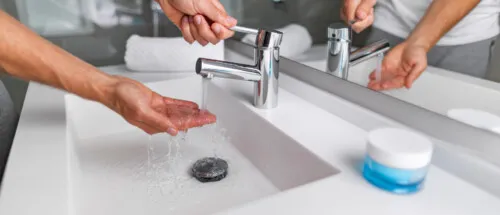Is your water starting to smell like rotten eggs? While no one enjoys the rotten egg smell in water, it can be a common problem for homeowners, especially those with well water. Good clean water should be free of tastes and foul odors. You shouldn’t have to drink foul-tasting water or bathe in water that smells. If your water has an unpleasant taste or rotten egg smell, we can help.
Below, we’ll explore what causes sulfur water, the risks associated with sulfur water, and let you know how to treat sulfur water so you can enjoy clean, safe water.
In This Article
- What Causes Sulfur Water?
- Health Risks of Drinking Sulfur Water
- How to Remove Sulfur From Water
- Schedule Your Free Water Test Today
- Frequently Asked Questions
What Causes Sulfur Water?
When someone mentions “sulfur water,” they’re most likely referring to water that smells like rotten eggs. Hydrogen sulfide gas (H₂S) causes this rotten egg smell in water. While hydrogen sulfide is a poisonous gas, the levels in water are generally more of a nuisance than a health risk.
Hydrogen sulfide is a naturally occurring element found in different forms and compounds. It can get in your water in two ways. Firstly, it is naturally produced when organic substances break down, such as decaying plants and bacteria, which can be dissolved in drinking water.
Secondly, it’s also common in wells, especially those drilled in high shale or sandstone concentration and water heaters containing magnesium rods. Thus, the odor is more noticeable when using hot water, as heated water releases the gas more quickly than cold water.
Hydrogen Sulfide Gas
Hydrogen sulfide forms when organic matter breaks down without oxygen, which is common in deep wells. As that gas travels through your pipes and reaches the tap, it’s released into the air, bringing that unmistakable rotten egg smell with it. You might notice the odor more in cold water, especially if it disappears after a flush but then creeps back again. That’s a sign the source hasn’t been fully dealt with.
Sulfur Bacteria
These bacteria thrive in warm, low-flow areas, like aging wells or less-used pipes. They feed on natural sulfur in the water and produce hydrogen sulfide gas as a byproduct. On top of that, they create slimy films that stick to the inside of pipes and plumbing fixtures, making the smell stubborn and hard to shake until the bacteria are fully removed.
Water Heater Reactions
Sometimes, the smell shows up only in hot water. In that case, your water heater may be to blame. The anode rod inside – especially if it’s made of magnesium – can react with sulfur in the water and create extra hydrogen sulfide. If hot water is the only issue, replacing the rod with a different material might do the trick.
Health Risks of Drinking Sulfur Water
Can sulfur water make you sick? The answer depends on the levels of hydrogen sulfide present in the water. For most homes, the levels are not high enough to cause any significant health concerns. However, if the concentration gets too high, it can cause stomach aches and nausea and become problematic for infants.
The biggest problem is taste and smell. But, too much sulfur in your water can lead to the following issues:
- Diarrhea and dehydration: Drinking water with high levels of sulfate can cause diarrhea which leads to dehydration.
- Bitter taste: Scale deposits in pipes cause a bitter taste which keeps people from drinking enough water, potentially leading to mild dehydration.
- Clogged pipes: Encourages the growth of slimy, thick iron bacteria that clings to pipes and slows water flow.
Moderate levels of hydrogen sulfide also do not cause serious health issues but can cause other problems, including:
- Foul odor: Causes rotten egg odor, which can make food and beverages unappetizing.
- Stain fixtures: Hydrogen sulfide may cause yellow or black stains on fixtures in the bathroom and kitchen
- Corroded metal: Wears away metals, especially iron and steel, which can shorten the lifespan of your plumbing.
- Stained laundry: Hydrogen sulfide can leave black stains on laundry.
How to Remove Sulfur From Water
The first step, have a professional test your water. While there are at-home water testing kits available, you’ll need a professional to identify the cause of the issue. For instance, is it associated with hydrogen sulfide gas in your groundwater, plumbing, or your water heater? You also want to ensure there are no other contaminants present in your water due to sewage pollution.
According to the EPA, even if you aren’t worried about sulfur levels, those with private wells will want to check their water levels every year.
Once you know the cause and level of your water’s hydrogen sulfide odor, you can take the proper steps to remove the contaminants.
Chlorine Bleach
Chlorine bleach can remove medium to high levels of hydrogen sulfide. Shock chlorination floods a well with a strong chlorine solution to wipe out sulfur bacteria colonies. This method can work for a few months, but it doesn’t always last. Always follow state guidelines, ventilate the well cap area, and retest water a few days later. Re-treat only when bacteria return; over-chlorination can harm pumps and pipes. Then a filter system removes the sulfur, iron, and magnesium sediments that have formed. Regular maintenance and replacement of filters are recommended.
Iron Removal Filter
An iron removal filter can remove low to moderate levels of hydrogen sulfide in addition to iron and magnesium. The filter oxidizes the hydrogen sulfide, separating the sulfide and forming a solid, which the filtering process removes.
These are highly specialized systems with a complex potassium permanganate recharging process. The filter’s installation and operation must be exactly followed as directed, and filters must be replaced regularly.
Aeration Removal Method
Aeration (adding air to the water) removal methods may remove the levels of hydrogen sulfide in your water. This method requires an aerator installed between the well and a non-pressurized water storage tank. The storage tank and aeration system must be secure to prevent contamination of the water supply.
Activated Carbon Filters
Activated carbon filtration is suitable for the removal of low levels of hydrogen sulfide (typically below 0.3 ppm). Carbon filters are commonly installed under sinks to treat drinking and cooking water. Since this method removes low concentrations of sulfur, there may continue to be a lingering odor present. Filters must be removed and replaced often.
Oxidizing Filters (Manganese Greensand or Catalytic Carbon)
Oxidizing filters are suitable for moderate levels of hydrogen sulfide (0.3–6 ppm) and are commonly used in residential water systems. These filters convert hydrogen sulfide gas into solid sulfur, which is then filtered out. Manganese greensand filters use potassium permanganate to regenerate, while catalytic carbon offers a chemical-free option. Both require regular maintenance.
Replace or Adjust Water Heater Anode Rod
If your hot water smells like sulfur, your water heater’s anode rod might be to blame. Swapping it out for an aluminum–zinc rod can usually solve it. This reduces the chemical reaction that forms hydrogen sulfide inside your water heater tank. Flushing the heater afterward removes any remaining odor-causing gas.
Whole-Home Filtration Systems
For persistent odors throughout your home, a whole home water filtration system is often the most comprehensive fix. These systems can combine multiple technologies (like catalytic carbon, aeration, and sediment filtration) and are designed to treat all water entering the home. A water treatment professional can test your water and recommend the best combination based on your needs.
Schedule Your Free Water Test Today
If you cannot locate the source, smell odors in both hot and cold water, or see stains on fixtures, reach out to a certified water treatment specialist. A water professional can test your system, figure out what’s in your water, and help you find treatment options that work. Expert help also prevents trial-and-error spending on equipment that may not solve the whole problem.
Leaf Home Water Solutions’ professionals will guide you toward the best water treatment method for your situation.
Drink clean, safe water at home. Schedule your water test today!
Frequently Asked Questions
Is it safe to drink water that smells like rotten eggs?
Most people can drink low-level sulfur water without harm, though the taste is unpleasant. High hydrogen sulfide levels or combined contaminants warrant professional testing before continued use.
Can sulfur water make you sick?
In rare cases, very high gas levels can cause headaches or nausea. More often, the taste keeps people from drinking enough water, which can lead to mild dehydration. It’s best to drink bottled water until the issue has been taken care of.
Why does only my hot water smell like sulfur?
A magnesium anode rod in the water heater is likely reacting with natural sulfur. Replacing the rod with aluminum–zinc or an odor-resistant option usually resolves the issue.
How do I test for sulfur in my water?
Have your water tested. Purchase a home hydrogen sulfide test kit or send a sample to a certified lab. Lab tests also reveal iron, manganese, and bacteria that may require additional treatment.
Will a water softener remove sulfur smell?
Standard water softeners do not remove hydrogen sulfide gas. You will need activated carbon, aeration, or an oxidizing filter designed for sulfur odor control.



